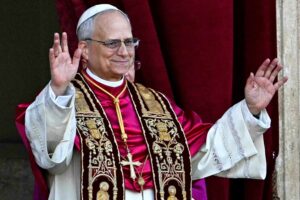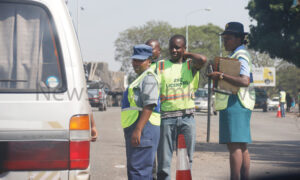In recent weeks, a picture of the Bulawayo City Hall circulated on social media with citizens unimpressed by the state of its interior.
In response, Bulawayo, Councillor Solomon Mguni, said that councillors are like Board Directors and ‘the mayor is Board Chairman. Ceremonial at that’.
Mayors are the face of local urban government in Zimbabwe. But how much power and authority do they have on the running of their cities?
In this factsheet FactCheckZW looks at the differences between ceremonial and executive mayors; and the powers exercised by various players in local government.
Ceremonial, not executive?
From 1980 to 1989, city and municipal councils in Zimbabwe were presided over by ceremonial mayors who had very limited powers. Executive powers were shared between the Minister and the Town Clerk in whose appointment national government is involved. As a consequence, the Minister could determine policy priorities in the administration of cities and towns and control their day-to-day activities.
The period between 1990 and 1999 saw a shift in government’s decentralisation policy. There was a move towards democratising and empowering local government, with one of the most significant changes being the 1996 amendment to the Urban Councils Act, which provided for directly elected executive mayors.
In 1996, the government conferred executive powers on mayors, changing the power structure in urban local government. Whereas ceremonial mayors stayed clear of the management of a city, executive mayors were involved in its day-to-day running.
Under the ceremonial mayoral system, major council decisions took the form of full council resolutions. Conversely, in the executive mayoral system, local authorities did not have to wait for a full council resolution to make important decisions.
Working through the executive committee, which was chaired by the mayor, the council could make major decisions ahead of full council sittings. The executive committee consisted of the mayor and all chairpersons of council committees.
Contrary to their ceremonial counterparts who were mere signatories, convenors of council meetings and guests of honours at council events, executive mayors had an elevated level of influence and control because of their executive powers.
In 2008, legal reform saw national government abolishing, through amendment of the Urban Councils Act, the post of executive mayor. Legal reform then provided for the post of ceremonial mayor, elected from amongst or outside the membership of the council, reverting to the pre-1996 situation.
This means that from 2008 to date, Zimbabwe has ceremonial, not executive, mayors.
Local Boards and Town Councils employ Town Secretaries to head their administrations while the Municipal and City Councils’ are headed by Town Clerks. Different heads of departments deputise the head of administration. The executive are then responsible for the implementation of council decisions and for the day to day running of council affairs.
Key players in town management
Cities and towns are run using powers delegated to various arms. The central government is the responsible authority and runs the local authorities through the minister of local government who delegates his power to various bodies and offices including the Local Government Board; mayor and councillors; and the town clerk and council employees.
The primary instruments for doing this are the Constitution and the Urban Councils Act.
Local Government Board
This is established through Section 116 of the Urban Councils Act which states that:
(1) There is hereby established a board to be known as the Local Government Board.
(2) The Local Government Board shall consist of seven members appointed by the Minister
Functions of Local Government Board – Section 123
(1) The functions of the Local Government Board shall be—
(a)to provide guidance for the general organization and control of employees in the service of councils; and
(b)to ensure the general well-being and good administration of councils staff and the maintenance thereof in a high state of efficiency; and
(c)to make model conditions of service for the purposes stated in paragraphs (a) and (b) for adoption by councils; and
(d)to make model regulations stipulating the qualifications and appointment procedures for senior officials of councils; and
(e)to approve the appointment and discharge of senior officials; and
(f)to conduct inquiries into the affairs and procedure of councils; and
(g)to exercise any other functions that may be imposed or conferred upon the Board in terms of this Act or any other enactment.
(2) In the exercise of its functions in terms of this Act, the Local Government Board may or, where so directed by the Minister, shall—
(a)require any council or any councillor, employee or agent of a council to produce any document, book or other record;
(b)summon and examine any witness who the Board considers may be able to assist it in the conduct of any inquiry; and
(c)obtain information and advice from any council or any employee or agent of any council.
(3) For the purposes of any inquiry carried out by it in terms of this Act, the Local Government Board shall have the same powers as are conferred upon commissioners in terms of the Commissions of Inquiry Act [Chapter 10:07], other than the power to order a person to be detained in custody, and sections 9 to 13 and 15 to 19 of that Act shall apply, mutatis mutandis, in relation to such an inquiry and to any person summoned to give or giving evidence at that inquiry.
(4) Any inquiry conducted by the Local Government Board may be conducted in an informal manner and the rules of procedure and evidence applicable in criminal or civil proceedings need not be observed at the inquiry:
Provided that the person presiding over the inquiry shall ensure that substantial justice is done.
Other key actors are the town clerk and chamber secretary whose appointments are laid out in Sevtions (132) and (133), respectively, of the Act, as follows:
132 Appointment of town clerk and secretary
(1) Subject to this Part, a municipal council shall appoint a person approved by the Local Government Board to be the town clerk of the municipality.
(2) The executive committee of the municipal council concerned shall recommend to the Local Government Board the names of suitable candidates for appointment to the post of town clerk.
(3) Subject to this Part, a town council shall appoint a person approved by the Local Government Board to be the secretary of the council.
(4) The town council concerned shall recommend to the Local Government Board the names of suitable candidates for appointment to the post of secretary.
133 Appointment of chamber secretary
(1) The executive committee of a municipal council shall, in addition to any other departments of the council, establish a department responsible for the provision of administrative and secretarial services to the council, and such department shall be headed by a chamber secretary.
(2) Subject to this Part a municipal council shall appoint a person approved by the Local Government Board to be the chamber secretary in respect of a department of council established in terms of subsection (1).
(3) The council shall recommend to the Local Government Board the names of suitable candidates for the post of chamber secretary.
Mayor vs Town Clerk
It should be noted that an Executive Mayor had executive authority and was responsible for the running of the council. With ceremonial mayors, this duty lies with the town clerk as laid out in Section (136) of the Urban Councils Act:
136 Functions of town clerk
(1) The town clerk shall be responsible for—
(a)the proper administration of the council; and
(b)managing the operations and property of the council; and
(c)supervising and controlling the activities of the employees of the council in the course of their employment.
(2) For the purposes of subsection (1), the town clerk, in addition to any other duties that may be assigned to him by the council, the executive committee or the mayor, as the case may be, shall—
(a)direct, supervise, appraise, develop and report on the work and conduct of all council employees and take appropriate measures to ensure efficiency, and discipline among all council employees; and
(b)where so authorized by the mayor or chairman, sign orders, notices, or any document requiring authentication, or execution on behalf of the council, the executive committee, the mayor or the chairman, as the case may be; and
(c)recommend to the executive committee the measures necessary to safeguard the finances and assets of the council; and
(d)take such steps as he considers to be necessary for the purpose of giving effect to any resolution of the council, or of any decision or directive of the executive committee; and
(e)account to the mayor and, where necessary, to the council or the executive committee for the performance of any tasks entrusted through him to the employees of the council; and
(f)make such recommendations to the council or the executive committee, or any committee of the council as he considers to be necessary or desirable to effect economies, improve co-ordination and, generally, to improve the operations of the council or committee concerned; and
(g)introduce, implement and monitor adequate control systems; and
(h)be responsible for the effectiveness and efficiency of the organization of the council and the co-ordination and, where necessary, the integration of its activities and, for such purposes, he may, after consultation with the head of the department concerned, inspect, inquire into and investigate the working and administration of any department or section thereof, either by himself or through any person authorized by him:
Provided that—
(i)nothing in this subsection shall be deemed to derogate from the personal responsibility of a head of department for the proper, efficient and effective management of his department;
(ii)where a head of a department disagrees with any directive of the town clerk, he shall carry out such directive, and record any reservations he may have, in writing, and lodge them with the town clerk and the mayor;
(iii)where a head of department lodges his reservation in terms of proviso (ii), the town clerk shall lodge his reply, in writing with the mayor.
(3) The town clerk may delegate to any other employee of the council any functions conferred or imposed upon him in terms of this Act, and such employee shall exercise the powers or carry out the duties in accordance with such directions as the town clerk may give him.
The mayor, even ceremonial, is not without his own powers:
64 Functions of mayor
(1) The mayor shall be responsible for—
(a)the supervision and co-ordination of the affairs of the council concerned and the development of the council area; and
(b)through the town clerk, controlling the activities of the employees of the council concerned.
(2) In addition to the responsibilities referred to in subsection (1), a mayor of a municipality shall have the following functions—
(a)presiding over all meetings of the council at which he is present; and
(b)presiding over all meetings of the council’s executive committee at which he is present; and
(c)presiding over all ceremonial functions of the council; and
(d)signing orders, notices and documents that require execution or authentication by or on behalf of the council; and
(e)when necessary, causing investigations to be conducted into allegations of misconduct, whether on the part of councillors or employees of the council; and
(f)with the approval of the council, fixing the conditions of service of employees of the council; and
(g)exercising any function that the council may delegate to him in terms of subsection (3); and
(h)exercising any other function that may be conferred or imposed upon him, whether in terms of this Act or any other enactment.
(3) A municipal council may and, if so directed by the Minister, shall delegate to the mayor any of its functions.
(4) The council may at any time amend or revoke any delegation in terms of subsection (3), other than a delegation effected at the direction of the Minister.
(5) A mayor may at any time remove from office the chairman of any committee of the council:
Provided that any such removal shall be confirmed by a resolution passed by two-thirds of the total membership of the council.
Under the Act, councils do not have a free choice in the appointment of senior officials and, if the council appoints a town clerk without getting the Board’s approval, it would have contravened the Act.
Who does the buck stop with? Town Clerk or Mayor?
According to the Urban Councils Act:
139 Conditions of service of town clerk
(2) A council shall not discharge a town clerk unless the discharge has been approved by the Local Government Board.
On the other hand, according to the same Act in Section (114):
114 Suspension and dismissal of councillors
(1)Subject to this section, if the Minister has reasonable grounds for suspecting that a councillor—
(a)has contravened any provision of the Prevention of Corruption Act [Chapter 9:16]; or
(b)has contravened section one hundred and seven section one hundred and eight or section one hundred and nine; or
(c)has committed any offence involving dishonesty in connection with the funds or other property of the council; or
(d)has been responsible—
(i)through serious negligence, for the loss of any funds or property of the council; or
(ii)for gross mismanagement of the funds, property or affairs of the council;
whether or not the councillor’s responsibility is shared with other councillors or with any employees of the council;
According to the Urban Councils Act, council can neither hire nor fire a town clerk without the approval of the Local Government Board, but the minister can fire a mayor, who is considered a councillor.
The council, though, can begin proceedings to discharge a town clerk of his duties and once a decision has been made, approach the board for approval.
However, the Constitution is the supreme law of Zimbabwe and overrides anything to the contrary in the Urban Councils Act or any other law, and Section (114) may be in contravention of Section (278) of the Constitution.
Section 278 of the Constitution deals with the tenure of mayors and councillors. It states:
“An Act of Parliament must provide for the establishment of an independent tribunal to exercise the function of removing from office mayors … and councillors.”
This means that the Minister can no longer suspend mayors and councillors under section 114 of the Urban Councils Act, because this should be done through an independent tribunal.
Back to the tattered carpet at City Hall
The Bulawayo Mayor in his Facebook post claimed that he is akin to the city’s ceremonial board chairman and that expecting him and his councillors (board members) ‘to see every crack on the floor of a Company building when they should be making policy may be asking for too much. It is the duty of the Managers as headed by the CEO or the General Manager; as the case maybe (sic) to notice leaks on a factory roof or paint pealing (sic) off the walls and advise the operatives to attend’.
This factsheet seeks to give information to the residents so that they may make a decision on whether it is ‘too much to ask’ that the mayor see the tattered carpet or if this is the duty of the town clerk through his managers.
Please share your thoughts with us on Twitter @zwFactCheck or Facebook- FactCheckZW.











